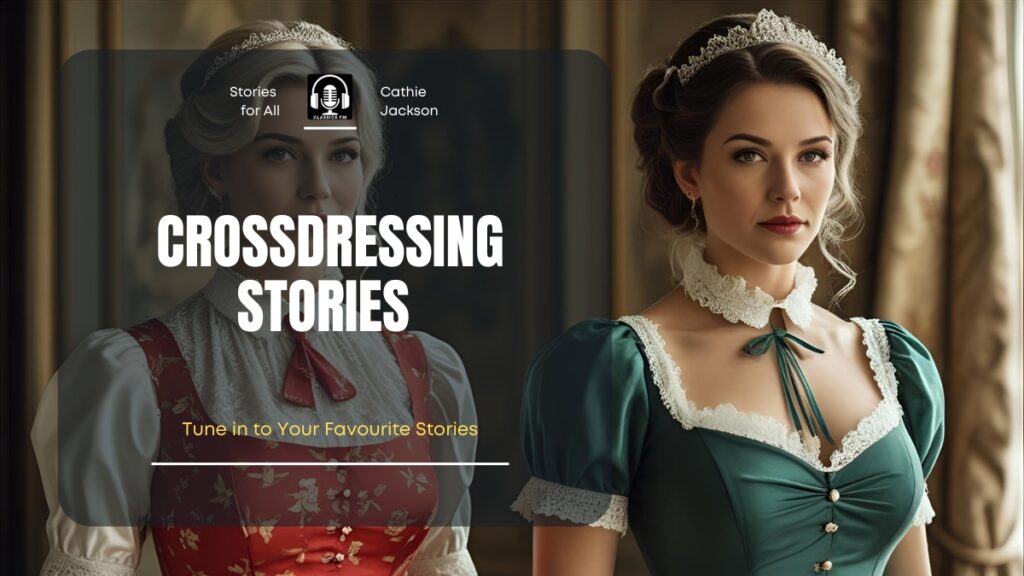Oktoberfest stories for students in english are short, friendly tales that teach language and culture. They use simple words, clear scenes, and fun characters. Students read, listen, and speak while they learn about music, food, and festivals.
What students learn
- Useful festival and food words.
- Short reading and speaking practice.
- How to describe people, places, and feelings.
- Simple facts about Munich and family traditions.
How to use them:
- Teach 6–8 key words first.
- Read the story aloud and ask two quick questions.
- Let students retell the story in pairs.
- Finish with a drawing or a one-sentence diary line.
Who it’s for: elementary and middle-school learners, beginner to intermediate ESL students, and busy teachers who want ready-to-use lessons.
Try one story today and watch how “Oktoberfest stories for students in english” bring language and culture to life.
Quick Facts About Oktoberfest (answering the search intent)
- Oktoberfest is a popular Bavarian festival held in Munich.
- It often runs from late September to the first weekend in October.
- Millions visit each year—typically over five million visitors.
- The festival features traditional music, food, rides, and parades.
These facts give context for the stories. Students will understand where and why the festival happens.
How to use these Oktoberfest stories in class
- Pre-teach key vocabulary. Pick 10–12 words from the story.
- Read aloud. Teacher models pronunciation and rhythm.
- Pair work. Students retell the story to each other.
- Comprehension checks. Short quizzes or oral questions.
- Creative tasks. Draw a scene, write a diary entry, or act a short play.
Oktoberfest Stories for Students in English
Step into the colorful world of Oktoberfest! From twirling pretzels to cheerful music, these Oktoberfest stories for students in English bring fun, culture, and new words to life in every page.
1. The Lost Hat at Oktoberfest
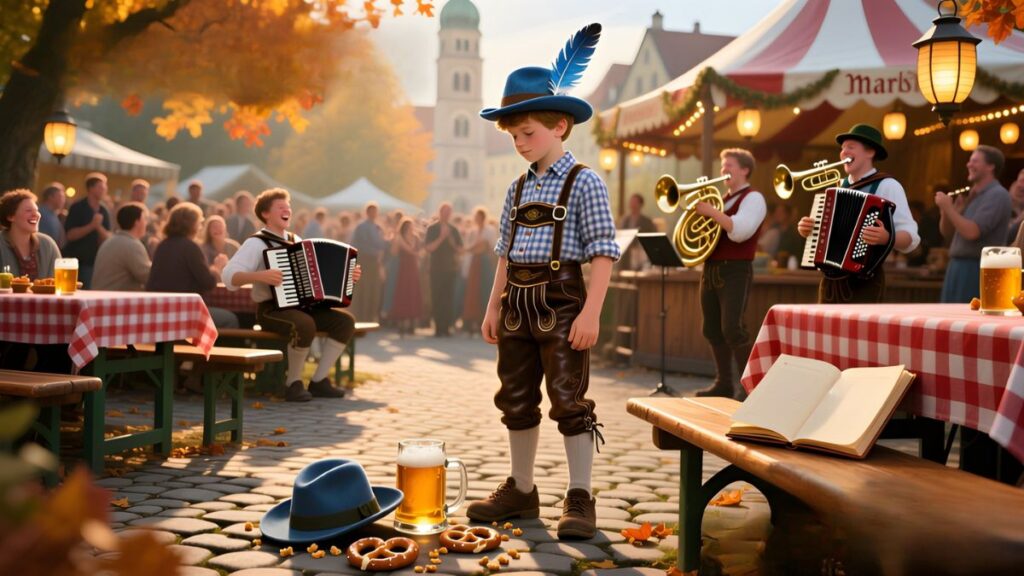
The sun was shining brightly over the Oktoberfest fairgrounds. Flags waved in the wind. Music and laughter filled the air.
Jonas clutched his little green hat. His grandmother had made it last year. It had a tiny feather and a small pretzel-shaped button.
He loved wearing it. Today was the first day of Oktoberfest. He was excited to see everything.
They walked past food stalls. Sausages sizzled on grills. Sweet pastries and candy filled the air with delicious smells.
Jonas let go of his hat for a second. He pointed at a giant chocolate heart.
When he turned back, the hat was gone.
“Grandma!” he shouted. “My hat! It’s gone!”
His grandmother held his hand. “Don’t worry. Let’s look carefully,” she said.
Jonas’s heart raced. He didn’t know where to start.
A girl nearby noticed him. She wore a bright red dress. “Did you lose something?” she asked.
“My hat,” Jonas said. “It’s green with a feather.”
“I’ll help you look!” she said.
Another boy joined them. “We can search together,” he said.
Jonas felt better. Three heads were better than one.
They started at the food stalls. The smells were amazing. The crowd was thick.
At the pretzel stall, a man twisted giant pretzels. “Looking for something, young man?” he asked.
Jonas showed him the hat. The man shook his head. He gave Jonas a warm pretzel anyway.
Jonas smiled. Even without his hat, the festival was fun.
Next, they checked the music tents. Accordion music played loudly. People clapped along.
Jonas peeked under benches. He looked behind chairs. The music made everything feel magical.
Lila looked on top of tables. Max checked near the stage. They were determined.
“Maybe it fell on a ride?” Max suggested. “The Ferris wheel over there?”
They ran to the Ferris wheel. Children laughed in line. Jonas remembered holding his hat during the ride.
He asked the operator. “Have you seen a green hat?”
“Hmm,” she said. “Sometimes lost items end up in the prize area.”
They hurried to the prize area. Stuffed animals and shiny toys were stacked high.
Jonas’s heart beat faster. Could his hat be there?
He pushed through the crowd. And then he saw it.
There it was, on top of a giant teddy bear.
“My hat!” Jonas shouted. He reached for it carefully.
Lila and Max cheered. “You found it!”
Jonas placed it back on his head. He straightened the feather. It felt even more special now.
He hugged Lila and Max. “Thank you for helping me,” he said.
“Friends help each other,” Lila said.
Max nodded. “And searching for something lost can be an adventure.”
Jonas realized they were right. He had seen the food stalls, heard the music, and made new friends.
The afternoon went by quickly. They played games. They shared pretzels. They rode the Ferris wheel.
Jonas laughed more than ever. His hat seemed to shine brighter with all the stories attached.
They passed a stand selling roasted nuts. Jonas bought a small bag. He shared some with Lila and Max.
They ran to a game stall. Children tried to win giant stuffed animals. Jonas watched, excited.
He tried a ring toss. The rings wobbled and fell. But he laughed.
The friends cheered for each other. Every small victory felt big.
Jonas saw a carousel spinning. Painted horses bobbed up and down. Children waved happily.
They stopped at a candy stall. Lila bought a stick of candy. Max picked chocolate. Jonas chose a small gingerbread heart.
They continued exploring. Music from the parade floated through the fairgrounds.
Jonas tapped his foot to the rhythm. He imagined marching along with the drums.
The crowd was busy and lively. Jonas held tightly to his hat. He didn’t want to lose it again.
They passed a tent full of toys. Bright colors sparkled everywhere. Jonas’s eyes grew wide.
Max found a small game with wooden blocks. They tried to build the tallest tower.
Blocks toppled over. They laughed together. The tower fell again.
Jonas felt proud of trying. He realized fun wasn’t just winning. It was sharing the moment.
They wandered toward the end of the festival. Lights began to glow as evening approached.
Jonas’s grandmother called him. “Time to go soon,” she said.
Jonas nodded. He didn’t want the day to end.
He looked at his hat. It had been lost, but now it was safe.
The day had taught him something important.
Friends, adventures, and teamwork made everything better.
He hugged Lila and Max one last time. “See you next year!” he said.
The three waved goodbye. Their laughter echoed in the evening air.
Jonas walked home with his grandmother. He held the little green hat tightly.
He remembered every detail of the festival. The smells, the sounds, the rides, the games, and the people.
He smiled. Losing the hat had led to a wonderful adventure.
At home, he placed the hat on his bed. The feather glimmered in the soft light.
Jonas whispered to himself, “I’ll never forget this Oktoberfest.”
The festival, the hat, and the friends were memories he would carry forever.
Even in the quiet night, he could still hear the laughter and music.
Jonas closed his eyes. He dreamed of next year’s Oktoberfest.
He imagined more adventures. He imagined more friends. He imagined fun and laughter.
His heart felt full. The little green hat had been lost, but he had gained so much more.
Activity Idea for Students:
Write your own “lost and found” story.
Imagine you lost a toy, hat, or favorite item at a festival.
Where would you look? Who would help you?
Use words like rides, stalls, music, treats, prizes to make your story exciting.
2. Sofia and the Painted Mug
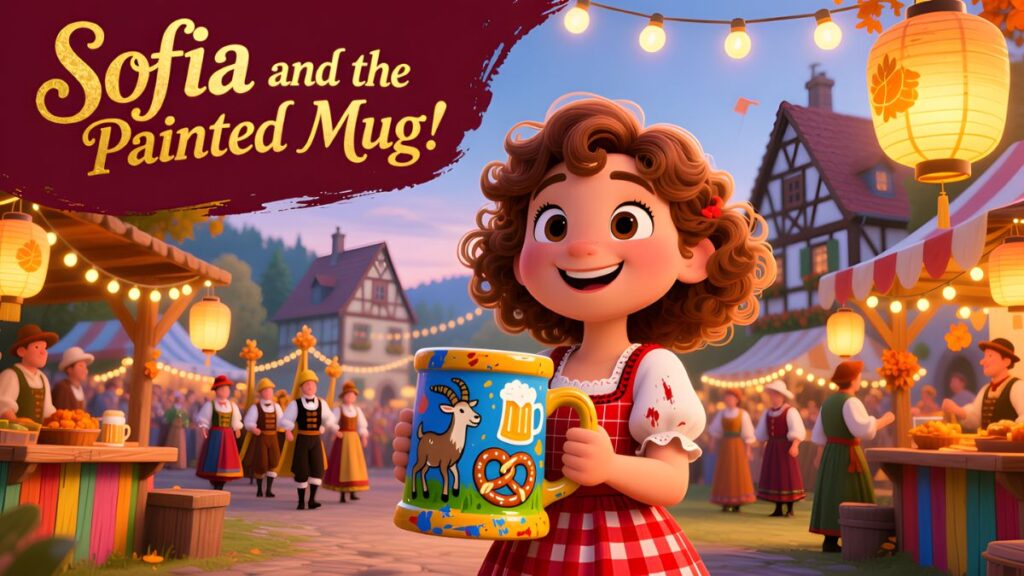
The sun shone brightly over the Oktoberfest fairgrounds. Flags waved in the gentle breeze. Music filled the air.
Sofia held her paintbrush tightly. Her small apron was spotless and ready. Today was the children’s workshop.
The workshop tent was full of colors. Tables were covered in paint pots and blank mugs. Children crowded around.
Some children laughed. Some whispered ideas to friends. Some stared carefully at their mugs.
Sofia picked up a clean white mug. She wanted it to be perfect. She thought carefully about what to paint.
She decided on blue flowers. Blue was her favorite color. It reminded her of sunny skies.
She dipped her brush into the paint. The cool liquid felt smooth. She began painting each petal.
One petal at a time, she worked carefully. She added a green stem. Tiny leaves grew along the stem.
Finally, she wrote her name neatly on the side. Her mug felt alive. She smiled with pride.
Nearby, a boy painted bright red hearts. Another child made a rainbow. The workshop was full of creativity.
The teacher walked around. She praised children for their effort. Sofia felt encouraged.
The paint on the mugs was still wet. The colors were bright and vivid. Sofia admired them quietly.
A girl next to her painted little stars. Her brush moved quickly. She hummed a cheerful tune.
Sofia’s mother leaned over. “It’s beautiful,” she said. Sofia blushed. “Thank you,” she whispered.
The teacher collected the mugs. They would be fired in a small oven. The children waited eagerly.
Sofia imagined how her blue flowers would look after baking. She pictured the petals shining in the light.
She watched the festival outside. People walked past with pretzels and balloons. Children ran from stall to stall.
Music played nearby. Accordion tunes filled the air. Everyone seemed happy and excited.
Sofia felt her heart flutter. She loved the festival. She loved painting. She loved the energy around her.
Finally, the teacher returned. “Your mugs are ready,” she said. Sofia’s eyes sparkled.
She picked up her mug carefully. The blue flowers gleamed. The green stem looked even brighter.
She turned it in her hands. It was perfect. She ran her fingers over the smooth surface.
Just then, a girl approached. She had bright eyes and braids in her hair. She held a painted mug.
Sofia noticed the designs. Little suns and smiling faces covered it. The colors were cheerful.
The girl spoke in a language Sofia did not understand. She pointed to Sofia’s mug.
Sofia tilted her head, puzzled. Then the girl smiled. She held out her mug.
Sofia realized she wanted to trade. She nodded carefully. She handed over her blue flower mug.
The girl handed hers in return. Sofia looked closely. It had stars and a sun.
The girl pointed to a word on the side. “Sonnenschein,” she said slowly.
Sofia repeated it carefully. “Sonnenschein.” She smiled. “Sunshine,” she whispered.
Her new mug felt warm in her hands. It was more than a mug. It was a memory.
Sofia thanked the girl. They waved and smiled. Sofia felt happy and proud.
She carried the mug through the festival. She imagined drinking cocoa in it at home.
She passed stalls with roasted almonds. She smelled fresh pretzels. She imagined sharing them with her family.
Children ran past, holding balloons. Music played in the distance. The festival felt magical.
Sofia found a quiet corner. She drew suns and stars in her notebook. She wrote “Sonnenschein” next to each drawing.
A boy nearby laughed. “Your suns look like smiley faces!” he said.
Sofia laughed too. They shared ideas about colors. They talked about favorite patterns.
The afternoon passed quickly. The festival was alive with sounds, colors, and laughter.
Sofia explored more stalls. She saw gingerbread hearts with colorful icing. She saw shiny toys and balloons.
She noticed a carousel spinning. Painted horses bobbed up and down. Children laughed as they rode.
She watched a group learning a folk dance. Their feet stomped in rhythm. She tapped along with them.
Sofia felt inspired. She wanted to paint more. She wanted to learn more words.
She returned to the workshop tent. Some children were trading mugs. Some were painting new ones.
She found a scrap piece of paper. She painted little suns and flowers. She imagined giving them to friends.
The teacher walked by. “You are very creative,” she said. “And learning new words too. Wonderful!”
Sofia beamed. She felt proud. She had learned more than painting. She had learned friendship.
She noticed the sky turning orange. The sun was setting. Flags fluttered in the breeze.
The festival began to quiet down. Families walked home, holding mugs and balloons.
Sofia hugged her new mug. It was full of memories. It was full of sunshine.
She thought about the girl she had met. She thought about the new word she learned.
The smell of pastries filled the air. She imagined baking at home with her family.
She remembered the music. She remembered the colors. She remembered the laughter.
Sofia promised herself she would paint again. She promised herself she would trade again.
She would learn more words. She would meet more friends.
As night fell, she placed the mug on her bedside table. She whispered, “Sonnenschein.”
She felt warmth in her chest. The festival, the painting, and the friendship danced together in her mind.
She smiled. Creativity, kindness, and curiosity had made her day magical.
Sofia closed her eyes. She dreamed of painting more mugs. She dreamed of more festivals.
She dreamed of sharing them with friends around the world.
The memory of the blue flowers and the stars stayed with her forever.
Sofia knew that a simple painted mug could carry stories, friendships, and sunshine.
And she knew she would always remember this Oktoberfest.
Activity Idea for Students:
Draw your own “Oktoberfest mug.” Use bright colors and fun designs.
Write a few sentences in English about your mug. Include:
- Your favorite colors
- Special patterns or designs
- A word from another language
3. Leo and the Parade Drummers
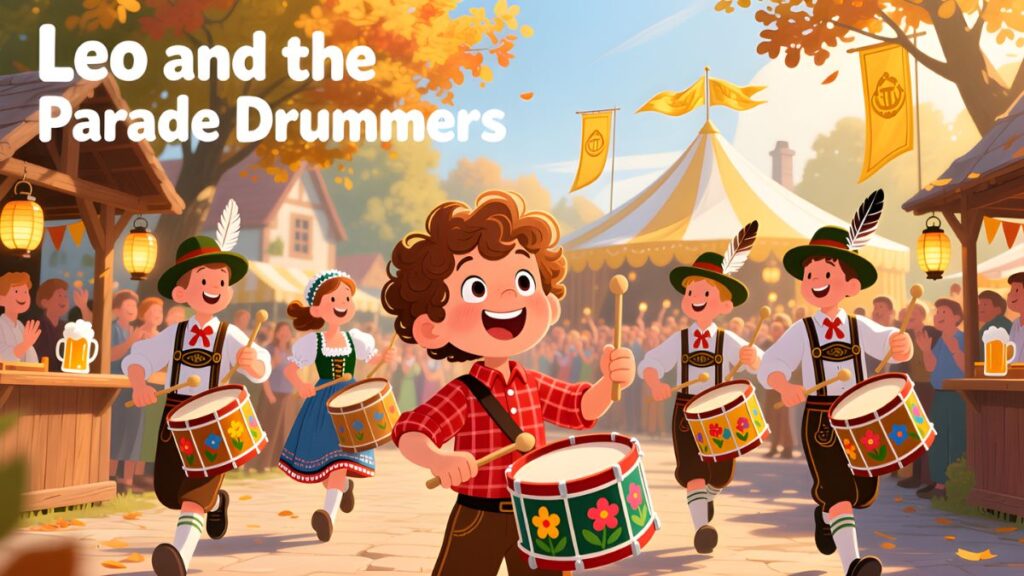
Leo woke up early. The sun was just rising. Today was the Oktoberfest parade.
He jumped out of bed. His heart beat fast. He had been waiting for this day all year.
The streets were already busy. Families walked together. Music floated through the air.
Flags waved in the gentle breeze. People wore colorful costumes. Children laughed and ran.
Leo tightened his shoelaces. He carried a small drum he had borrowed from his school.
He dreamed of marching in the parade. He wanted to play the drums proudly.
He walked toward the main square. Bands were practicing. Drums and flutes sounded everywhere.
He watched the musicians carefully. Their movements were precise. Their music was lively and exciting.
Leo’s eyes sparkled. He wanted to join them. He imagined the crowd clapping along.
A tall drummer noticed him. He smiled. “Do you want to try?” he asked.
Leo nodded eagerly. His heart thumped.
The drummer handed him a small drumstick. “I’ll teach you a simple rhythm,” he said.
Leo listened carefully. Tap, tap, tap. Tap, tap. The rhythm was simple, but it sounded important.
He tried to follow. His hands fumbled. The beats sounded messy.
“Don’t worry,” the drummer said. “Everyone starts somewhere. Practice makes perfect.”
Leo practiced again and again. Tap, tap, tap. Tap, tap. His fingers grew sore.
He stumbled at first. The rhythm felt tricky. He wanted to give up.
But he remembered his dream. He wanted to play in the parade. He wanted to feel proud.
He tried again. This time, his taps were smoother. Tap, tap, tap. Tap, tap.
The drummer smiled. “Better! Keep going. You can do it.”
Leo grinned. He felt encouraged. He practiced until his arms were tired.
The children’s group was waiting. They waved him over. “Come join us!” they said.
Leo ran to them. His drum bounced lightly on his chest. He felt nervous but excited.
The parade began. Music filled the streets. People clapped and cheered.
Leo held his drum tightly. He focused on the rhythm. Tap, tap, tap. Tap, tap.
The crowd smiled. They followed the beat. Clapping along.
Step by step, he marched. He kept his eyes forward. He listened carefully.
He made a small mistake. Tap, tap… pause. He felt embarrassed.
But he remembered the drummer’s words. “Don’t give up. Keep going.”
He breathed deeply. He continued the rhythm. Tap, tap, tap. Tap, tap.
The children’s group marched together. Their drums and feet created harmony.
Leo felt proud. He was part of something bigger than himself.
The streets were full of cheering people. Flags waved above. Music floated in the air.
He noticed little children dancing nearby. Parents clapped along. Everyone enjoyed the parade.
Leo focused on each beat. He felt the rhythm inside him. Tap, tap, tap. Tap, tap.
The parade wound through the streets. Leo’s arms ached, but he kept going.
The drummer watched from the side. He nodded. “You’re doing well,” he shouted.
Leo smiled. Encouragement made him stronger. He kept playing.
At the end of the parade, people clapped loudly. Leo’s face lit up.
His parents waved at him. “We’re so proud!” they shouted.
Leo’s friends joined him. They laughed and cheered. “You did it!” they said.
He hugged his drum. He felt strong. He had accomplished his goal.
The drummer came over. “Remember this feeling,” he said. “You earned it.”
Leo nodded. He wanted to play again next year. He wanted to lead a group someday.
They walked through the festival afterward. Music still played. Lights twinkled on tents.
Leo felt excited about the future. He wanted to practice more. He wanted to learn new rhythms.
He tapped on small drums in the festival tents. Tap, tap, tap. Tap, tap.
Children joined him. They laughed and tapped along. They shared the joy of music.
Leo realized the festival was more than a parade. It was friends, courage, and celebration.
He thought about how hard he had worked. The mistakes, the practice, and the nerves.
It all led to this moment. The applause, the smiles, the pride he felt.
He remembered the first time he picked up the drum. How unsure he had been.
Now he played confidently. Tap, tap, tap. Tap, tap. The rhythm felt natural.
The festival grew quieter as the evening came. The sun dipped below the horizon.
Leo’s heart was full. He had learned that courage and persistence mattered.
Even when something seemed hard, trying could lead to amazing results.
He looked at his drum. He felt proud. He hugged it gently.
The parade had taught him more than drumming. It had taught patience and courage.
He closed his eyes. He imagined leading his own group next year.
He imagined claps, smiles, and music echoing through the streets.
The festival lights glimmered. Music floated on the air. Children laughed.
Leo knew he would remember this day forever.
The rhythm, the crowd, the joy, and the pride would stay with him.
He whispered to himself, “I can do anything if I keep trying.”
Leo smiled. He dreamed of parades, music, and adventures yet to come.
He hugged his drum one last time before going home.
His heart was full. He had faced challenges and succeeded.
He learned that persistence and courage could create proud, happy moments.
Activity Idea for Students:
Clap out a simple rhythm like Leo did.
Then write 3–4 sentences about a time you felt proud of learning something new.
4. The Pretzel Contest
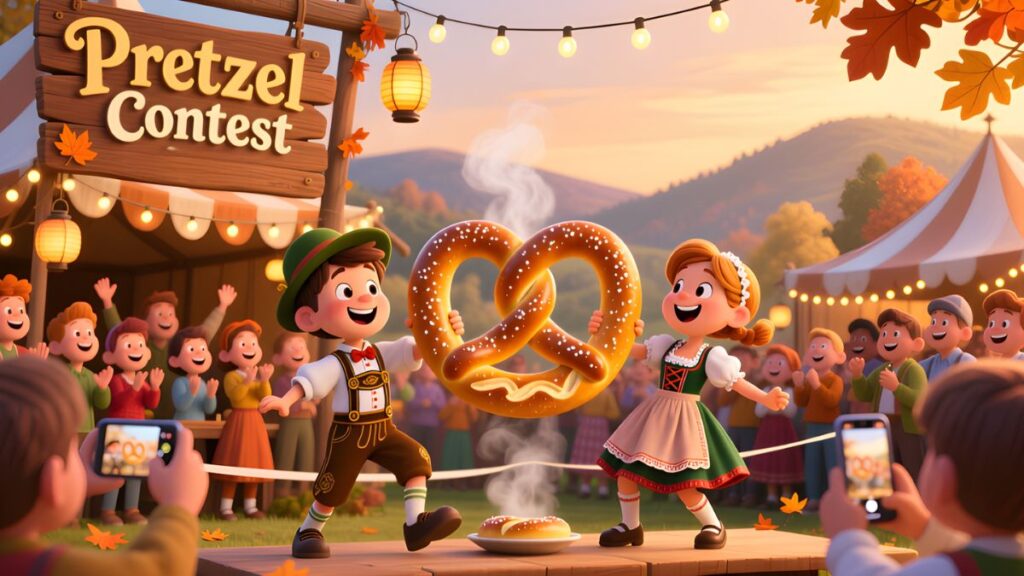
Emma woke up excited. Today was the school’s Oktoberfest fair. She could hardly wait.
The hallways were decorated with colorful flags. Paper lanterns hung from the ceiling. Music played softly in the background.
Emma skipped into the classroom. Tables were set up for a special activity. This year’s event: the pretzel-twisting contest.
Children crowded around. Some held dough. Some wore aprons. Everyone looked eager.
Emma picked up a small piece of dough. She rolled it between her hands. It felt soft and squishy.
Her brother, Lucas, stood nearby. He had twisted pretzels before. “I’ll show you a trick,” he said.
Emma watched carefully. Lucas made a loop, then crossed the ends. The pretzel looked perfect.
She tried to copy him. The dough slipped. Her shape looked strange.
Lucas laughed. “Don’t worry. It takes practice,” he said.
Emma rolled the dough again. She made a loop. Then she twisted the ends.
It didn’t look like a normal pretzel. It looked… funny.
Other children glanced over. They giggled. Emma felt a little embarrassed.
Lucas smiled. “Sometimes the funniest shapes are the best,” he said.
Emma laughed. She tried again. Her pretzels twisted into odd shapes.
Some looked like animals. Some looked like loops and squiggles. All were different.
The teacher walked by. “Remember, this is about having fun!” she said.
Emma felt relieved. Winning wasn’t the most important thing.
The contest began. Each child rolled, twisted, and shaped their dough.
Emma focused. She remembered Lucas’s trick. She made a loop and carefully twisted the ends.
Her pretzel looked unusual. It had a big twist in the middle.
Other children laughed and pointed. Emma giggled too.
She decided to keep it. The teacher came around to judge.
One by one, the pretzels were checked. Some were perfect. Some were messy.
When the teacher reached Emma, she held up the funny pretzel.
The classroom burst into laughter. Everyone clapped.
Emma felt proud. Even if she didn’t win, she had made everyone happy.
Lucas gave her a high-five. “See? Your pretzel is special,” he said.
The contest ended. The winners were announced. Emma didn’t win first prize.
But she didn’t mind. Her pretzel had made everyone smile.
The teacher praised her creativity. “Humor is a wonderful talent,” she said.
Emma carried her pretzel carefully. She showed it to her friends. They laughed together.
The fair continued. Children played games, ate snacks, and shared their pretzels.
Emma thought about the day. She had learned something important.
Teamwork mattered. Humor mattered. Having fun mattered most.
She rolled a small piece of dough again. This time, she made a funny animal shape.
Her friends laughed. They tried to copy her. The classroom was filled with giggles.
Lucas joined in. They twisted dough together. Their shapes were all different.
Some looked like hearts. Some looked like animals. Some looked like loops.
Emma realized the contest wasn’t just about winning. It was about sharing joy.
The smell of fresh pretzels filled the air. Children nibbled on their creations.
Emma watched the crowd. Faces were bright with laughter. Music played in the background.
The sun streamed through the windows. The classroom felt warm and cheerful.
Emma smiled. She remembered the first pretzel she had twisted.
It had slipped and looked strange. Now, she laughed at it.
Her brother laughed too. “You’ve gotten better!” he said.
They tried one more twist. Emma made a loop. Lucas added a twist.
Their pretzel looked wobbly, funny, and unique.
The children around them clapped. Everyone was enjoying the silly shapes.
Emma realized she would remember this day forever.
Not because she won a prize, but because she had shared laughter.
The festival continued with games, songs, and dancing.
Emma felt proud. She had learned to keep trying. She had learned to enjoy the moment.
Her friends crowded around. They wanted to try pretzel twisting too.
Emma showed them Lucas’s trick. They twisted, laughed, and tried again.
Some pretzels fell apart. Some were perfect. All were fun.
The teacher took pictures. “These will be memories for everyone,” she said.
Emma looked at the classroom. It was filled with joy. Colors, laughter, and funny pretzels everywhere.
The contest had brought everyone together. Children cheered each other on.
Emma hugged her brother. “Thank you for helping me,” she said.
Lucas smiled. “It was fun. Your pretzels are amazing.”
The day ended. Children packed up their creations. Music played the final notes.
Emma carried her funny pretzel home. She placed it carefully on a plate.
She smiled. She knew it wasn’t about winning. It was about teamwork and humor.
She remembered the laughter, the music, and the festival.
She promised herself she would twist pretzels again next year.
Even more funny, even more creative, and even more joyful.
The smell of baked pretzels lingered in the air. The memory of the day lingered in Emma’s heart.
She whispered to herself, “Fun and laughter are the best prizes.”
The classroom, the friends, the silly pretzels—they would stay in her memory forever.
Emma went to bed dreaming of pretzels, laughter, and the next Oktoberfest fair.
Her heart felt full. She had learned that trying, laughing, and sharing mattered more than any prize.
She hugged her pillow. She remembered all the funny shapes she had made.
She dreamed of creating more. Hearts, animals, loops, and twists.
And she smiled, knowing the festival had taught her something wonderful.
Activity Idea for Students
Invent your own “festival contest.”
Think about fun rules, challenges, and prizes.
Write a few sentences explaining how your contest works.
5. Maya’s First Dirndl
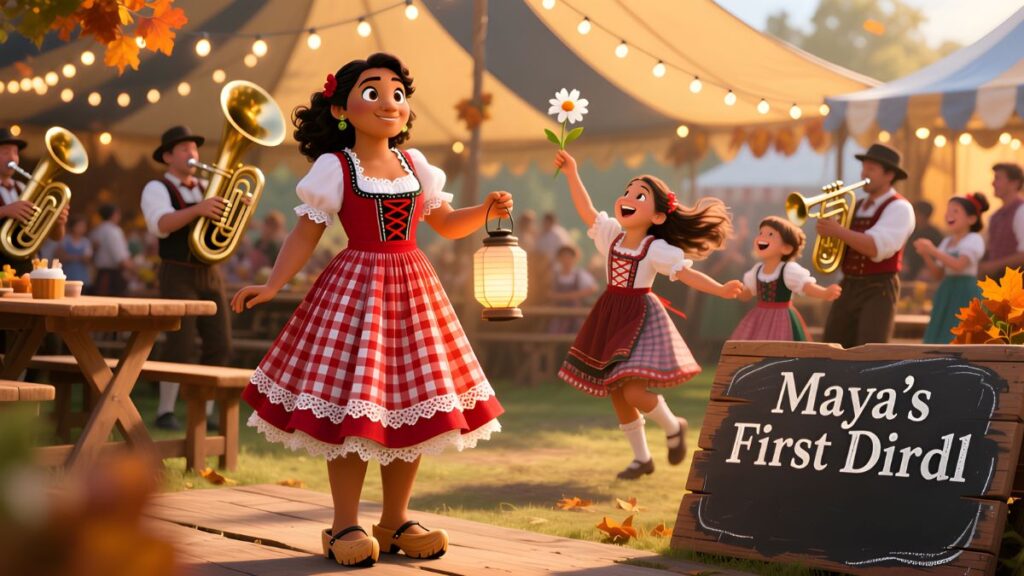
Maya woke up excited. Today was the Oktoberfest fair. She felt butterflies in her stomach.
Her grandmother knocked on the door. “I have a surprise for you,” she said.
Maya followed her into the living room. On a chair lay a small, handmade dirndl.
It was beautiful. Red and white with delicate embroidery. Tiny flowers were stitched along the hem.
Maya gasped. “It’s for me?” she asked.
Her grandmother nodded. “Yes, my dear. I made it just for you.”
Maya felt a warm glow in her chest. It was special. It was hers.
She carefully put on the dress. The skirt swirled around her legs.
The bodice fit perfectly. The tiny buttons gleamed in the sunlight.
She twirled in front of the mirror. The dress felt magical.
Her grandmother smiled. “It belonged to our family traditions. Now it belongs to you too.”
Maya felt proud. She imagined herself at the fair, wearing the dirndl.
They walked to the festival together. The streets were lively. Music and laughter filled the air.
Flags waved in the gentle breeze. Children ran past with balloons. The smell of pretzels and roasted nuts filled the air.
People noticed Maya’s dress. They smiled warmly. “What a beautiful dirndl!” they said.
Maya felt shy at first. But then she smiled back. She felt included.
Her grandmother held her hand. “You are part of our tradition now,” she whispered.
Maya looked at her reflection in a shop window. The dress made her feel special.
She realized it connected her to her family. To the past. To her heritage.
She walked past a carousel. Painted horses bobbed up and down. Children laughed and waved.
Maya spun gently. The skirt flared. She felt like she was dancing with history.
Her friends waved from across the fair. They admired her dirndl.
Maya felt proud. She had learned that clothing could tell stories.
They stopped at a pretzel stall. Maya chose a soft pretzel. She held it carefully.
Her grandmother laughed. “You carry tradition in more ways than one!”
Maya giggled. She thought about the generations before her. Her grandmother, her mother, her aunts.
All had worn similar dresses at festivals. She felt part of something bigger.
They passed a music tent. Accordion tunes floated in the air. Maya tapped her feet to the rhythm.
Her friends joined her. They clapped along. The festival felt alive.
Maya twirled again. The skirt swished around her legs. She imagined the people in her family watching her.
She imagined her grandmother as a little girl. Wearing a similar dress. Laughing. Dancing.
Maya felt connected. She felt love. She felt joy.
The festival continued. They wandered past stalls with toys and treats.
Maya noticed a lantern tent. Children were painting lanterns. She thought about trying one.
Her grandmother nodded. “A little craft will make the day even more special,” she said.
Maya painted a small flower on a lantern. It matched the flowers on her dirndl.
Other children admired her work. They asked questions about her dress.
Maya explained it was handmade by her grandmother. They listened with wide eyes.
She felt proud. She had shared a piece of her culture.
They stopped near the parade. Children in costumes marched by.
Maya waved. The music played. She tapped her feet. Her dirndl swirled around her.
People cheered. They smiled at her. Maya felt like part of the festival.
She remembered her grandmother’s words. “Tradition is alive when we carry it forward.”
Maya realized her dirndl was more than a dress. It was a story.
It was family, history, and identity woven into fabric.
She imagined her mother as a little girl. Wearing similar dresses. Smiling in the festival crowd.
Maya felt the connection deeply. She held her grandmother’s hand.
They walked through a market of crafts. Wooden toys and painted mugs were everywhere.
Maya admired the colorful decorations. She imagined her family celebrating here years ago.
The smells, the sounds, and the laughter felt familiar. Even though she had never been here as a child.
She saw children playing games. She joined a ring toss. She laughed when she missed the first try.
Her grandmother clapped. “It’s not about winning. It’s about enjoying the moment,” she said.
Maya smiled. She realized the festival was about family too.
She twirled one more time. The skirt of her dirndl swirled beautifully.
She noticed other children admiring the dress. Some asked where she got it.
Maya explained proudly. It was handmade by her grandmother.
People smiled and nodded. They appreciated the tradition.
The parade began. Musicians marched down the street. Drums and flutes played lively tunes.
Maya clapped along. She felt proud of her heritage. She felt happy to be part of the festival.
The sun began to set. The lights in the festival tents glimmered.
Maya held her grandmother’s hand tightly. She didn’t want the day to end.
She looked around. Children were laughing. Families were eating pretzels. Music filled the air.
Maya remembered all the women in her family. Each had worn a dress like hers.
She felt connected to them. Their stories were alive in her.
Her grandmother smiled. “You carry our family with you,” she said.
Maya nodded. She felt the warmth of tradition. She felt proud and happy.
They stopped at a food stall. Maya chose roasted nuts. She shared them with friends.
They wandered to the craft tent again. Maya painted another small flower.
She thought about the generations who had celebrated before her.
Her friends asked her questions about the dress. Maya answered proudly.
The evening grew darker. Lanterns lit the paths. Children held glowing lights.
Maya felt the festival magic around her. The dirndl felt like it belonged to the night too.
She twirled one last time. The fabric shimmered in the lantern light.
She hugged her grandmother. “Thank you for this beautiful dress,” she said.
Her grandmother smiled. “It’s yours to cherish and carry forward,” she said.
Maya realized she had learned something important.
Clothing could tell stories. Clothing could connect generations.
The dirndl had made her feel proud of her identity.
It had shown her the importance of family heritage.
The festival ended. They walked home slowly. Music still echoed softly.
Maya held her dress carefully. She imagined wearing it again next year.
She dreamed of dancing, laughing, and celebrating her family traditions.
Her heart felt full. She had experienced more than just a festival.
She had learned about who she was and where she came from.
She placed the dirndl carefully in her room. It shimmered in the soft light.
Maya whispered, “I will always remember today.”
The memories, the dress, and her family’s love stayed with her forever.
Even in her dreams, the festival danced around her.
She knew her heritage would always be part of her.
And she felt proud to carry it forward, one twirl at a time.
Activity Idea for Students:
Draw or describe clothing from your own culture.
Think about colors, patterns, or special details.
Write 2–3 sentences explaining what makes it special and why it matters to you.
6. The Lantern Parade
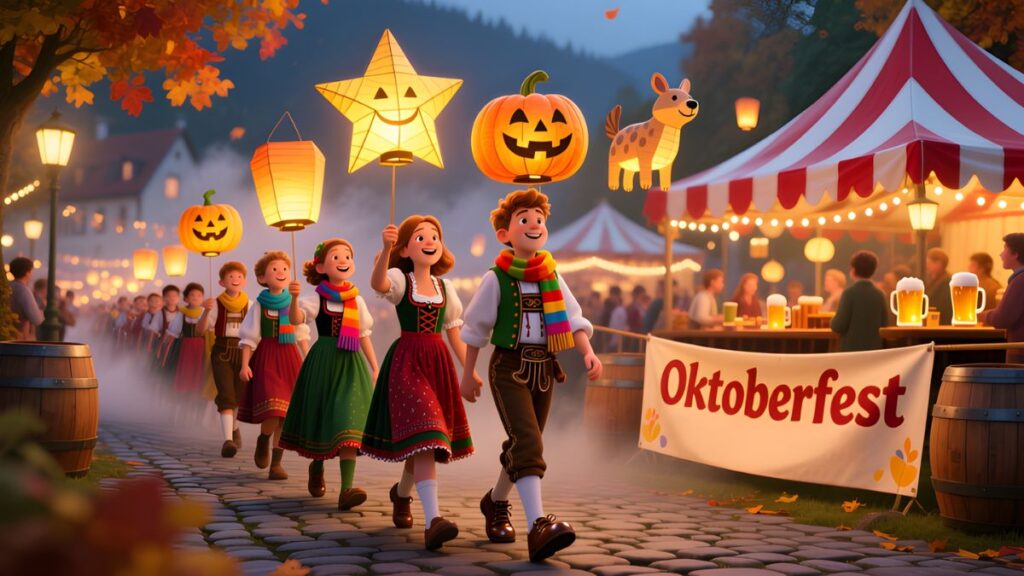
The sun was setting over the Oktoberfest fairgrounds. The sky turned pink and orange. Lights began to twinkle everywhere.
Children gathered in a line. Each held a lantern. The paper lanterns glowed softly in the evening light.
Max held his lantern tightly. He had decorated it with stars and moons. He felt proud of his work.
Other children smiled. Some lanterns were red. Some were blue. Some had flowers and patterns.
The music began. Soft drums and flutes played. The parade was about to start.
Everyone clapped. The excitement made Max’s heart beat fast.
The teachers reminded them to stay in line. “Walk carefully. Keep your lanterns glowing,” they said.
Max looked around. He saw friends holding lanterns high. The lights flickered gently.
He felt proud. They had worked hard decorating the lanterns.
The parade began. Children walked slowly through the streets. Lanterns glowed softly.
People lined the sidewalks. They clapped and smiled. Some took pictures.
Max and his friends followed the rhythm of the music. Their lanterns bobbed gently in the night air.
He felt the cool breeze. It made the flames flicker. The soft glow felt magical.
The children laughed quietly. They whispered about their designs. “I love your stars,” said a girl.
“Thanks! I love your flowers,” Max replied.
Suddenly, a gust of wind blew. Max’s lantern flickered. Then it went out.
“Oh no!” he whispered. The paper lantern was dark.
He felt disappointed. He had worked so hard on it.
A girl behind him noticed. “Don’t worry. We’ll help you,” she said.
Her friends gathered around. They held their lanterns close to Max’s.
Carefully, they relit his lantern. A soft glow returned.
Max smiled. “Thank you,” he said. His heart felt warm.
The teachers nodded proudly. “See? Teamwork makes everything brighter,” they said.
The children continued walking. The lanterns glowed in a river of light.
Max looked at his friends. Each one smiled. Each lantern shone brightly.
He realized the parade was more than lights. It was kindness, cooperation, and friendship.
The music floated through the streets. The soft drums echoed gently.
People clapped along. Some sang quietly. The festival felt alive.
Children walked carefully. They didn’t want the flames to go out.
Max held his lantern tightly. He glanced at the other children. Everyone was helping each other.
A boy stumbled slightly. His lantern tilted. Another child steadied it.
They laughed together. No one got upset. Everyone worked together.
The glow of hundreds of lanterns lit the path. It looked like a river of stars.
Max felt proud. They had created something beautiful together.
The parade wound through the streets. Houses were decorated with lights. People waved from windows.
The children’s lanterns reflected on the cobblestone. The effect was magical.
Max thought about how the wind had blown out his lantern.
He realized it didn’t matter. His friends had helped. Together, they had kept the glow alive.
The parade continued. The music changed to a gentle tune. Children moved slowly.
Max saw younger children carrying smaller lanterns. He held the taller ones carefully.
A girl tripped slightly. Max held out his hand. “Are you okay?” he asked.
She nodded. “Yes. Thank you.”
They walked together. Each lantern glowed softly. The group felt united.
The teachers cheered. “Look at your teamwork! Everyone is helping each other!”
Max smiled. The lesson was clear. Kindness and cooperation made everything better.
The parade reached the festival square. Lanterns glowed all around.
People clapped. The music played a lively tune. Children waved at the crowd.
Max held his lantern high. It flickered gently. He felt proud.
He looked at the friends who had helped him. He smiled. They nodded back.
Together, they had solved a problem. Together, they had kept the lights glowing.
The crowd cheered louder. Lanterns reflected in children’s eyes. Magic filled the air.
The children stopped in the center of the square. They formed a circle.
Each lantern was raised high. The soft glow lit their smiling faces.
Max looked around. He saw his friends’ proud expressions.
A teacher spoke. “You have shown cooperation, kindness, and care for each other.”
Max realized the parade was about more than lights. It was about hearts working together.
The lanterns danced softly in the evening breeze. They looked like tiny stars floating in the night.
The children walked carefully back toward the festival tents. They didn’t want to let the glow fade.
Max whispered to his friends. “This was the best parade ever.”
They laughed quietly. The lanterns glowed. The music followed them softly.
They passed the carousel. Painted horses bobbed gently. Children waved as they rode.
The smell of roasted nuts filled the air. Max shared some with his friends.
The children stopped to admire the crafts. Paper lanterns, wooden toys, and painted mugs were everywhere.
Max thought about how important teamwork had been tonight.
If the children hadn’t helped him, his lantern would have stayed dark.
He smiled at the lesson. Cooperation and kindness made everything shine brighter.
The festival continued. Music played from the tents. People danced. Children laughed.
Max held his lantern close. He imagined the glowing lights as stars in the sky.
He thought about the wishes everyone might be carrying in their hearts tonight.
A girl whispered her wish aloud. Max listened quietly. She wished for happiness for her friends.
Max smiled. He felt a warm glow inside. The parade had taught him about caring for others.
The children continued walking through the lantern-lit streets. Each step felt magical.
Max remembered the first time the wind blew out his lantern.
He realized it was the best moment. It showed him the power of helping each other.
The parade ended near the festival tents. The children carefully placed their lanterns on tables.
People gathered around. They admired the soft glowing lights. The effect was breathtaking.
Max’s friends smiled. They had worked together. They had created something beautiful.
He hugged his lantern gently. “Thank you for helping me,” he said.
The teachers nodded proudly. “You have all shown kindness and teamwork,” they said.
Max looked at the crowd. Smiles were everywhere. Children and parents alike enjoyed the glowing lights.
He thought about how small acts of help could make a big difference.
The lanterns flickered softly in the night. Max felt proud of himself and his friends.
He imagined carrying this lesson forward to school, home, and life.
The festival square was full of laughter, music, and glowing lanterns.
Max walked with his friends toward the exit. They waved to the crowd.
He realized that the parade had made him feel connected.
Connected to friends. Connected to the festival. Connected to the joy of teamwork.
The music played softly in the background. Children laughed and whispered. Lanterns flickered gently.
Max promised himself he would always help others.
Even a small act could brighten someone’s night.
The festival lights twinkled. The children’s lanterns reflected in their happy eyes.
Max felt a warm glow in his chest. He had learned the meaning of kindness.
The children waved goodbye to the festival. They had shared laughter, joy, and teamwork.
Max held his lantern one last time. He whispered a wish for everyone’s happiness.
He smiled. The night, the parade, and the glowing lights would stay in his memory forever.
Activity Idea for Students
Make a paper lantern drawing.
Decorate it with stars, patterns, or colors you like.
Write a short “festival wish” inside your lantern.
Share it with your classmates and explain your wish.
7. The Secret Recipe
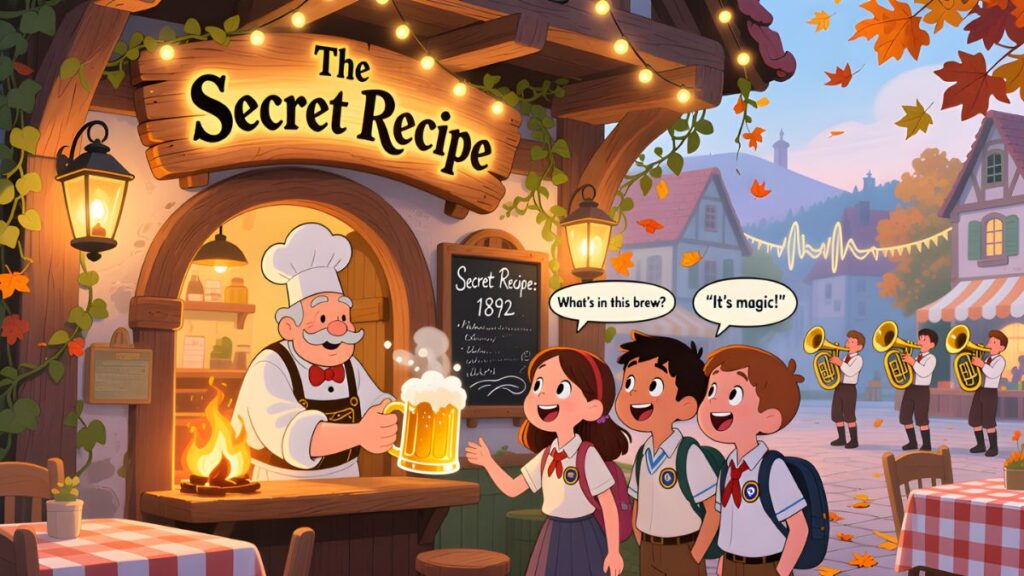
Tom woke up early. Today was the Oktoberfest fair. He could smell pastries from the bakery nearby.
His family ran a small food stall. It sold treats from old family recipes. Tom loved helping there.
He ran to the stall. His grandmother smiled. “Good morning, Tom,” she said.
Tom noticed a small notebook on the shelf. The cover was worn. Pages were yellowed with age.
He picked it up carefully. “What’s this?” he asked.
His grandmother’s eyes twinkled. “It’s our secret recipe book,” she said.
Tom flipped through the pages. There were recipes for cakes, cookies, and pastries.
One recipe caught his eye. Apple strudel.
He read carefully. Ingredients listed in neat handwriting. Instructions detailed and precise.
He realized this was a very old recipe. His grandmother had kept it for years.
Tom felt excited. He wanted to help make it.
His grandmother nodded. “Would you like to bake it with me?” she asked.
Tom jumped with joy. “Yes!” he shouted.
They washed their hands. Flour dusted the counter. Bowls and spoons were ready.
Tom measured sugar. He measured flour. He felt like a real baker.
His grandmother peeled apples carefully. Tom sliced some. The aroma filled the air.
Cinnamon sprinkled over the apples. Tom stirred them gently.
The dough was soft. Tom helped roll it out. His hands got sticky.
His grandmother guided him. “Keep it thin, but careful not to tear it,” she said.
Tom concentrated. The dough stretched carefully across the counter.
He added the apple mixture. Carefully, he rolled the strudel.
His hands shook slightly. The dough almost slipped.
His grandmother smiled. “Slowly, gently,” she said. Tom tried again.
They brushed the strudel with butter. Golden layers promised a delicious treat.
The oven was warm. Tom helped slide the strudel in. The aroma began to fill the stall.
Customers passed by. They sniffed the air curiously. Some smiled and asked questions.
Tom’s grandmother shared stories. “This recipe has been in our family for decades,” she said.
Tom felt proud. He realized he was part of a tradition.
The strudel baked slowly. Golden crust formed. Sweet smell filled the fairgrounds.
People stopped at their stall. Some looked at the pastries. Others watched Tom and his grandmother bake.
Tom smiled. He stirred a small bowl of leftover apples. They were soft and fragrant.
A little girl approached. “Is that apple strudel?” she asked.
Tom nodded. “Yes! Would you like to try a piece?”
She clapped her hands. “Yes, please!”
Tom served her carefully. She took a bite. Her eyes sparkled.
“This is delicious!” she said. Tom grinned.
Other children gathered around. The smell of baked apples and cinnamon drew more visitors.
Tom felt proud. He had helped bake something special.
His grandmother nodded at him. “You did well, Tom. Very well,” she said.
They served slice after slice. People smiled and thanked them.
Tom noticed some customers taking pictures. They wanted to remember the delicious strudel.
The fair was lively. Music played. Children laughed. Families enjoyed the festival.
Tom’s hands were sticky from sugar. He didn’t mind. He felt happy.
He learned about patience. Baking required care. Measuring, mixing, and rolling all mattered.
The strudel was finally ready to share with everyone.
Tom sliced carefully. Each piece was golden and soft.
A young boy reached for a piece. He smiled and said, “Thank you!”
Tom realized how happy the smell and taste made everyone.
He helped clean the counter. Flour scattered across the surface. He laughed at the mess.
His grandmother smiled. “Baking is as much about joy as it is about recipes,” she said.
Tom nodded. He understood now. The secret recipe was not just the ingredients.
It was the care, the love, and the sharing.
More visitors came. They asked about the ingredients. Tom explained simply.
Apples, sugar, cinnamon, butter, and dough. Nothing fancy. Just care.
The fair felt magical. Music, laughter, and smells mixed together.
Tom’s friends waved from across the festival. They pointed at the strudel.
He waved back. He felt proud. He had helped create something wonderful.
The sun began to set. Lights twinkled in the stalls. Lanterns glowed softly.
Tom’s grandmother wrapped the remaining strudel carefully. Some would be saved for the next day.
Tom helped serve drinks and small treats. Customers continued to smile.
He noticed a family taking a picture. “Look at the strudel!” they said.
Tom felt proud. He realized that food could bring happiness.
He cleaned the bowls and spoons. Flour dusted his apron. He didn’t mind.
He watched as a little boy asked for a second piece. Tom handed it with a smile.
The crowd grew. People moved from stall to stall. Music played from different corners.
Tom thought about the recipe. How old it was. How many people had baked it before him.
He felt connected. Part of a long tradition. Part of his family’s story.
The smell of the apple strudel lingered. It mixed with roasted nuts and fresh bread.
Tom’s grandmother shared more stories. How her mother had baked this recipe. How her grandmother had taught her.
Tom listened carefully. Each story added meaning to the recipe.
The strudel was more than dessert. It was a family legacy.
Tom helped clean the stall one last time. The festival lights glimmered.
Children laughed nearby. Music played softly in the evening air.
Tom realized the secret recipe had taught him more than baking.
It had taught him patience, tradition, and discovery.
He felt proud. He had learned something important.
A customer thanked him again. “This is the best apple strudel I’ve ever tasted,” she said.
Tom smiled. “Thank you,” he replied. He felt warm inside.
The festival grew quieter as night approached. Lanterns lit the streets. Children waved goodbye.
Tom helped pack the stall. He and his grandmother carefully stored the remaining ingredients.
He thought about all the happy visitors. Each smile felt like a reward.
He realized the secret recipe was more than food. It was about bringing joy.
Tom hugged his grandmother. “Thank you for teaching me,” he said.
She smiled. “You are now part of the tradition, Tom,” she said.
He nodded proudly. He wanted to bake again. He wanted to share more treats.
The festival ended. Music faded. Laughter echoed softly.
Tom carried the memory of the sweet smell, the golden strudel, and happy visitors with him.
He promised himself he would keep the recipe alive.
He would pass it on one day. Just like his grandmother had.
Tom went to bed dreaming of cinnamon, apples, and golden crusts.
He dreamed of baking for friends and family. Sharing, smiling, and celebrating together.
The secret recipe had shown him the magic of tradition.
And he knew he would always remember this Oktoberfest.
Activity Idea for Students:
Write or draw your own “secret recipe.”
Include simple steps in English.
Share what makes it special and why it is important to you.
Classroom activities and lesson plans (practical, actionable)
1. Listening & speaking
- Play short audio clips of Oktoberfest songs.
- Ask students to note three sounds they hear.
- Have them describe the mood in one sentence.
2. Reading & vocabulary
- Give a graded story and a glossary.
- Students find synonyms and use the words in new sentences.
3. Writing
- Task: Write a postcard from Oktoberfest (50–80 words).
- Task: Create a short diary entry as a festival visitor.
4. Project-based learning
- Group project: Plan a mini-Oktoberfest in school.
- Roles: event manager, food stall lead, musicians, guides.
- Deliverable: A 1–2 page plan and a short presentation.
5. Cross-curricular ideas
- History: Research King Ludwig I and the first Oktoberfest.
- Geography: Map Munich and plot festival locations.
- Music: Explore brass band styles and simple rhythms.
Teaching tips for different levels
- Beginners: Use pictures and gestures. Keep sentences short.
- Intermediate: Add dialogues and role-plays. Include simple grammar tasks.
- Advanced: Assign research-based writing and presentations. Encourage critical thinking.
Vocabulary lists for lessons
Beginner (10 words): pretzel, tent, band, ride, music, dance, fair, crowd, smile, song.
Intermediate (10 words): parade, tradition, vendor, costume, historic, celebrate, invite, festival, melody, audience.
Advanced (10 words): oompah, procession, brewery (contextualized for cultural learning), heritage, ceremonial, folklore, ambience, artisan, gastronomy, itinerary.
Example lesson plan (45 minutes): Beginner level
- Warm-up (5 min): Show 3 photos of Oktoberfest. Elicit words.
- Vocabulary (10 min): Teach five words with pictures.
- Reading (10 min): Read “Anna and the Pretzel” aloud.
- Pair activity (10 min): Students complete a 5-question worksheet.
- Wrap-up (10 min): Quick drawing and one-sentence share.
Assessment Ideas
- Short quizzes (5–10 items) focused on vocabulary.
- Oral retelling: 1–2 minute summary.
- Creative projects: poster, diary, or mini-play.
- Peer review: students exchange postcards and give feedback.
Cultural notes & sensitivity (E-E-A-T friendly)
- Emphasize respect: Oktoberfest is a cultural celebration with deep local roots.
- Avoid stereotypes: Focus on facts and lived experiences.
- Age-appropriate content: Omit alcohol-focused scenes for young learners. Instead, focus on music, food, and traditions.
- Source suggestions for further reading: official festival pages, museum resources on Bavarian culture, and educational sites about German traditions.
FAQs (targeting long-tail keywords)
Q1: What are good Oktoberfest stories for young students?
A: Short, simple tales like “Anna and the Pretzel” work well. They focus on senses, food, and music. Use clear vocabulary lists and pictures.
Q2: How can I teach Oktoberfest history to ESL students?
A: Use a timeline, short biographies (e.g., King Ludwig I), and mock interviews. Keep text short and visual.
Q3: Are there free resources for Oktoberfest lesson plans?
A: Yes. Look for teacher blogs, cultural institute pages, and school resource sites that share printable sheets and songs.
Q4: Can Oktoberfest stories help improve speaking skills?
A: Absolutely. Role-plays, interviews, and dramatized scenes are great for speaking practice.
Q5: How long should a student story be for classroom use?
A: For young learners, 200–400 words. For intermediate readers, 400–700 words. Keep language age-appropriate.
Conclusion
These seven little stories bring Oktoberfest to life in a way children can feel and enjoy.
They show small moments: losing a hat, painting a mug, learning a drum beat, twisting pretzels, wearing a family dress, carrying lanterns, and baking with grandma.
Each story uses easy words and short scenes, so students can read, act, and talk about them.
The main ideas are simple and warm: friendship, creativity, courage, teamwork, family, kindness, and tradition.
Use the stories for fun classroom tasks: drawing, acting, clapping rhythms, or writing a short “lost-and-found” note.
Quick activities that work well:
- Draw your Oktoberfest mug and write one sentence about it.
- Clap the parade rhythm and say when you felt proud.
- Invent a silly festival contest and explain the rules.
- Make a paper lantern drawing and write a short wish inside.
- Draw or describe clothing from your family or culture.
- Write a one-paragraph “secret recipe” with simple steps.
Teach 6–8 festival words across the week (for example: stall, pretzel, lantern, parade, drum, recipe) and use them again in activities.
Keep assessment fun and friendly: short drawings, three-sentence reflections, or a small class show-and-tell.
Finish with a mini-class Oktoberfest: display students’ work, read favourite parts aloud, and celebrate what everyone learned.


